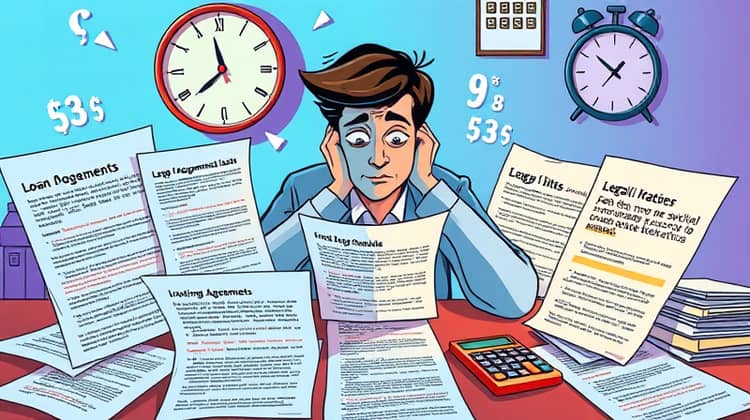Avoid These Loan Application Mistakes: A Step-by-Step Guide

When applying for a loan, the process can be both exciting and intimidating. With so many options available, it's easy to make mistakes that could cost you time and money. Understanding common pitfalls in the loan application process can help you avoid unnecessary complications and set you on the path to securing the best loan for your needs.
This step-by-step guide aims to highlight key mistakes to avoid while applying for a loan. By recognizing these missteps, you can enhance your chances of a smooth and successful loan application experience.
From understanding terms to evaluating your credit score, let's delve into some crucial errors that applicants often make, ensuring you're well-prepared as you navigate the complex world of loans.
1. Not Understanding the Loan Terms

One of the most significant mistakes applicants make is not fully comprehending the loan terms they are signing up for. Many borrowers may find themselves overwhelmed by the legal jargon and intricate details within loan agreements.
In doing so, they overlook critical information such as interest rates, repayment schedules, and potential penalties for late payments or early repayments. This lack of understanding can lead to financial strain down the road.
To ensure you grasp the terms completely, take the time to read through all documents meticulously. Don’t hesitate to ask the lender for clarifications on any points that seem confusing or unclear.
2. Ignoring Your Credit Score

Your credit score plays a vital role in the loan application process. Many applicants neglect this aspect, thinking it will not significantly impact their approval chances or the terms of the loan. However, lenders use credit scores to assess your creditworthiness and determine your interest rates.
By not being aware of your credit situation before applying, you risk receiving unfavorable loan terms or even denial of your application.
Assess your credit report well ahead of time so that you can address any issues that might arise and understand the possible interest rates you will be offered.
- Check your credit report for errors and dispute any discrepancies.
- Pay down existing debt to improve your credit utilization ratio.
- Consider boosting your score by making timely payments on bills.
It’s not just your score that matters, but also the overall financial picture that it represents. Understanding these factors will prepare you for what lenders will see when you apply for a loan.
3. Skipping the Pre-Approval Process

Many borrowers assume they can jump straight into applying for a loan without undergoing a pre-approval process. Skipping this critical step can be a costly mistake as it might lead to emboldened decisions regarding the loan amount or type you pursue.
Pre-approval helps in understanding how much you can realistically borrow and under what terms, allowing you to shop for loans more efficiently and negotiate better rates.
4. Providing Inaccurate Information

Another common mistake is providing false or inaccurate information, whether intentionally or unintentionally, during the loan application process. This can include overstating your income, misrepresenting your debts, or omitting necessary details that would affect your eligibility.
Lenders rely on the information you provide to determine your loan terms and risk profile. If discrepancies are found, it may result in loan denial or, worse, fraud charges.
- Double-check all information before submitting applications.
- Ensure all documents provided are complete and accurate.
- Communicate openly with lenders about your financial situation where necessary.
Being honest and thorough in your application fosters trust with lenders and ensures a smooth processing experience.
5. Applying for Multiple Loans at Once

While it may seem like a good strategy to apply to several lenders at once to find the best deal, this could negatively affect your credit score. Each loan application typically involves a hard inquiry on your credit report, which can lower your score temporarily.
Instead, consider focusing on a few well-researched lenders first before casting a wider net in your search.
6. Overlooking Fees and Closing Costs

Many borrowers are fixated on the interest rate when comparing loans and fail to account for additional fees and closing costs. These can add up significantly and affect your overall loan cost.
Always request a detailed breakdown of all fees associated with a loan before making a decision. Lenders are required to provide this information, so don’t hesitate to ask.
- Origination fees
- Appraisal fees
- Title insurance
- Closing costs
- Pre-paid taxes and insurance
Understanding the complete financial obligation will give you a clearer picture of what you'll ultimately pay, helping you avoid any unpleasant surprises later.
7. Not Considering the Total Loan Cost

Borrowers often fixate solely on the monthly payment and interest rate, overlooking the total cost of the loan over its lifetime. This can lead to significant financial strain, especially with long-term loans where interest accrues over time.
It's crucial to consider the total amount repaid, including interest, fees, and other costs associated with the loan.
8. Unaware of Loan Conditions

Each loan will come with specific conditions attached that may significantly affect your borrowing experience. Many applicants pay little attention to these conditions, assuming they are all standard.
Understanding conditions such as penalties for early repayment, changes in interest rates over time, or requirements for insurance or collateral can aid in selecting the most favorable loan for your needs.
9. Co-Signing Without Understanding the Risks

Co-signing a loan for someone else can be seen as a gesture of faith in that person's responsibility. However, many co-signers fail to grasp the potential risks involved in this decision.
If the borrower defaults, you may be held liable for the debt in full, adversely affecting your credit score and financial standing.
- Be aware of your financial capabilities to cover payments if needed.
- Understand how the loan impacts your credit and future borrowing options.
- Communicate clearly with the borrower about repayment plans.
Being a co-signer is a commitment that requires careful consideration and a clear understanding of the implications.
10. Rushing Through the Application

The loan application process can be lengthy and tedious, and it's tempting to rush through it, especially when there's a pressing financial need. However, haste often leads to mistakes that can jeopardize your application.
Take your time to go through all forms and required documents methodically. This will not only help you catch errors but also allow you to present a complete and compelling application.
Conclusion

Applying for a loan does not have to be a daunting process. Knowing the common pitfalls and preparing accordingly can greatly increase your chances of successfully securing a loan that meets your needs.
By taking the time to educate yourself on the loan process, from understanding terms to avoiding mistakes, you can navigate the landscape of lending with confidence and peace of mind.






